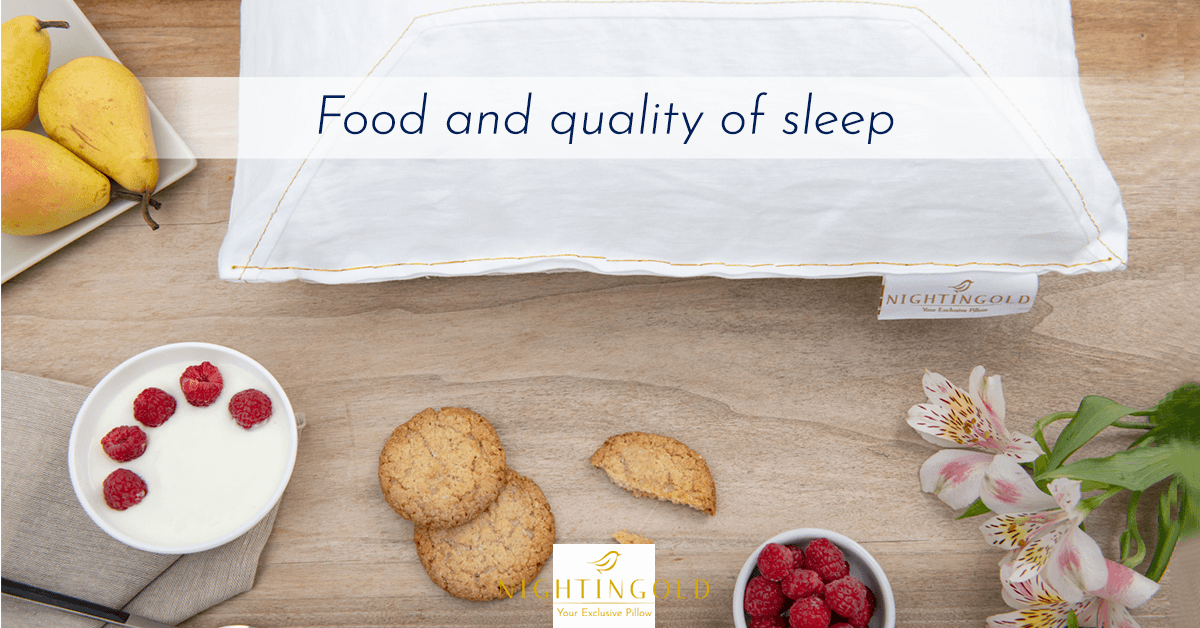Food and Sleep

The quality of your rest is a fundamental element for the overall health of your body and mind. And we know how food plays a key role on it.
Sleeping well reduces the risk of developing some chronic diseases, keeps your mind healthy and strengthens your immune system. (Article: The importance of a good night’s sleep)
Nutrition and its impact on your rest
Whether it’s “energy shock” after a cup of coffee or that feeling of drowsiness after Christmas lunch, you’ll certainly have experienced directly how nutrition can affect your energy and waking state.
We perfectly know how important is “staying light” at lunch time, particularly when we have to sit in the office or face endless meetings.
Two very complex mechanisms
However, we should not underestimate that both nutrition and sleep are two very complex mechanisms having a strong influence on our organism. A complexity that increases exponentially when we relate them.
At night, our rest is characterized by the alternation of 4 different phases, what we call sleep cycles. Sleep, in fact, is a dynamic mechanism with a specific and very complex architecture, which alternates different phases and cycles that allow the body to regenerate tissues and the mind. (Article: Sleep cycles and stages: do you know how it works?)
Science has done a lot of research on how nutrition impacts each stage of sleep, and there are many results, which you’ll find out in a very short time.
The 6 foods that can help you
Researchers, nutritionists and sleep experts have conducted several studies to try to understand the impact of diet on the quality of the sleep.
If the results of this research provide very interesting ideas, they cannot be considered definitive. If there is no food that alone can change the fate of your rest, there are some foods that have beneficial properties on its quality.
It is also a scientific evidence that nutrition has a direct impact not only on the ability to sleep well and on your energy level. Food choices, in fact, play a key role in many other aspects of your life, such as, for example, cardiovascular health and blood sugar levels.
For this reason it is essential to always consult a doctor or nutritionist before making drastic changes in your diet.
Learn below about foods that can help you improve the quality of your rest, and lots more.
We’ve prepared some advice for you to improve the quality of your rest.
1. Kiwis
Kiwis are a low-calorie food rich in many nutrients. One fruit contains only 42 calories, but alone it brings about 70% of the daily requirement of vitamin C and about 25% of vitamin K.
Eating Kiwi has a beneficial effect on your digestive health, thanks to the intake of fibers it owns. It is also rich in antioxidants, Vitamin C and carotenoids, soothing elements that reduce inflammation.
The ability of kiwis to improve sleep quality has been scientifically demonstrated. They have a high level of serotonin. Serotonin is a hormone produced by our organism, which affects the mechanisms of regulating sleep cycles.
Thanks to the intake of serotonin that kiwis provide, they are considered an excellent food to eat before going to sleep. Some publications of the National Library of Medicine also link the intake of antioxidants with positive effects on the quality of rest.
Some researchers checked the change in the quality of rest in 24 adults, after consuming 2 kiwis an hour before going to sleep every night, for 4 weeks. At the end of the study, participants fell asleep faster than the previous 4 weeks. The time it took to fall asleep was almost halved (-42%).
To date, science is seeking other evidence to officially state that kiwis take direct action in improving sleep quality more generally. However, eating 1 or 2 kiwis before bedtime will help you fall asleep more quickly.
2. Oilseeds
The family of oilseeds consists in foods often considered excellent for sleep, and more. In particular we talk about nuts, almonds, pistachios and cashews.
Eating almonds regularly, for example, has been associated with a reduction in the risk of contracting some important diseases, such as type 2 diabetes and heart problems. This benefit has been linked to the beneficial mix of the elements of which they are composed: monounsaturated fats, fiber and antioxidants.
Oilseeds also contain melatonin and other minerals essential for the proper functioning of some mechanisms of our body. Magnesium, phosphorus, manganese and reblofavin (or vitamin B2) are the main ones.
And it is precisely thanks to melatonin that such foods are considered beneficial for the quality of sleep. In fact they help to adjust the internal clock of your body, preparing it for a deep sleep.
There are a lot of researches about the correlation between almonds and sleep, and much more in progress.
However, clinical studies have shown that the combination of melatonin, magnesium and zinc helps elderly people suffering from insomnia to sleep more and better.
3. Cherry juice
Cherry juice has important beneficial effects on health. First of all, it offers your body some important nutrients such as magnesium, phosphorus and potassium.
In addition, it is a source of antioxidants. The intense color that characterizes the cherry is due to some pigments called anthocyanins, which are precisely antioxidants. These pigments seem to protect against capillary fragility and against various aging processes or cellular modifications caused by oxygen.
Cherry is also rich in flavonols, considered among the most powerful antioxidants for their molecular structure.
Many scientific studies have correlated this food with important benefits on rest, demonstrating how sleep quality of the selected sample of adults could change by drinking 1 to 2 cups of cherry juice per day.
The US National Library of Medicine published an interesting study of a sample of adults suffering from insomnia. Each had 240 ml of cherry juice drunk 2 times a day, for 2 whole weeks.
Their sleep improved considerably, increasing about 84 minutes compared to what they normally slept. Improvement that impacted not only the duration but also the quality of their rest.
These benefits were also directly related to the concentration of melatonin that this food possesses (the hormone that regulates the circadian rhythm and promotes healthy sleep). It seems to be higher than the quantity contained on average in other foods.
Moreover, the presence of antioxidants, of which cherry juice is rich, amplifies the calming and beneficial effect for sleep that melatonin induces.
4. White rice
Science has carried out several studies on the evening intake of carbohydrates and the impact they have on health in general and on the quality of rest.
While for many cereals the results are sometimes unclear, as far as rice intake is concerned, there is no doubt: white rice improves sleep quality.
The SleepFoundation.org published an interesting study on this subject involving 1848 Japanese adults , with different eating habits. For some of them rice represented the main food, others preferred bread and others noodles.
The study showed that those who ate rice slept more and better than those who used bread or noodles.
This result goes in the direction of confirming what has already been said in some previous studies: eating foods with a high glycemic index about 4 hours before going to sleep, helps the sleep phase.
But pay attention. This consideration cannot be applied to any food with a high glycemic index.
Sugary drinks and sweets are also foods with a high glycemic index. But taking them has absolutely not the same beneficial effect on your rest or even worst, on your health. On the contrary, such foods would worsen the quality of your sleep!
Also be careful not to overdo it with white rice. Due to its low fiber level and poor nutritional intake that distinguishes it, starting to eat it that every day could generate other types of compensation.
5. Passionflower
Native to tropical and subtropical areas, passionflower is known in herbal medicine for its therapeutic and healing properties. In fact it has been one of the most used natural remedies for disorders of the nervous sphere.
Thanks to its calming and relaxing action, passionflower can help you mitigate anxious forms and stress. It is a “green” sedative and it is able to improve insomnia.
It is the flavonoids that give passionflower very useful calming properties. These chemical compounds act on the central nervous system. In particular, they would be able to interact positively with the spinal cord area, our sleep centers.
In addition, it stimulates the production of Gamma-Aminobutyric Acid, that is, amino acids produced by our brain to counteract stress and states of strong arousal, as explained by the article published by the US National Library of Medicine.
It’s simple to understand how this fruit can promote deep relaxation states and contribute to the improvement of the speed of falling asleep.
A positive effect on sleep of infusion intake has been scientifically proven, thanks to a study carried out in 41 adults who saw a significant improvement in the quality of their sleep, already after 1 week of intake of the infusion.
6. Chamomile
Chamomile is a centuries-old medicinal herb already known in ancient Egypt, Greece and Rome.
It is known for its flavonoids, a class of very powerful antioxidants, with calming power over those inflammations that often cause chronic diseases, such as cancer and heart problems.
There is also evidence that drinking chamomile strengthens the immune system, reduces anxiety and depressive states, and improves skin quality.
In 2011, a study was carried out on 34 adults to demonstrate a correlation between chamomile intake and improved rest quality. A cup of chamomile extract has been taken 2 times a day for a portion of the adults, for 28 days.
The results were interesting. Those who regularly took the drink fell asleep faster and had much shorter night waking moments than those who took nothing. Results confirmed by another study, made specifically on the female population.
Drinking a chamomile infusion before bedtime, therefore, is certainly an experiment beneficial for you if you want to improve the quality of your rest.
Diet and rest: the Big Picture
Wishing to improve the quality of rest is natural, especially when leading a hectic lifestyle, in which the fast pace is certainly a source of great stress.
The solution, the one with a capital S, the one that suddenly allows us not to wake up at night and sleep deep sleep … well if we want to be realistic, that can’t be sought in a food.
Sleep is a complex mechanism, and is impacted by many factors including exposure to light, emotional tranquility, resting habits and the environment around us.
Nutrition is also a complex mechanism, made up of many small habits. And it can’t be a single food that makes a difference to the quality of your diet. It makes a cumulative effect, which depends on how much and what you eat for weeks, months and years.
The complexity of these 2 systems makes scientific research on their correlation very long and not at all trivial. As you may have understood from this article, there are many specific studies on the subject, but still science does not feel ready to make broader and more generalized statements.
If you really want to improve the quality of your rest and look for answers, start focusing on the “big Picture”, the habits that distinguish your daily life, both in terms of nutrition and rest.
Sleeping habits
When it comes to sleep habits we refer to the daily routines that are part of your daily life as well as the environment in which you sleep, factors that play a fundamental role in your ability to sleep well.
If it is true that some foods can support the functioning of sleep mechanisms, your daily habits and your bed environment hide many pitfalls that you need to learn to recognize.
An example is brightness. If your room is too bright or if you submit yourself to electronic devices when you get to bed, you have to know that you will find it much more difficult to fall asleep. In fact, the process of producing melatonin in your body could be negatively impacted, with the consequences that unfortunately you know very well.
The same goes for noise. And that’s not all.
If it is well known that artificial light and noise can disturb your sleep, it is much less known that the greatest causes of disturbed sleep reside right in your bed.
The mattress you are lying on and the pillow on which you rest your head are fundamental elements when it comes to the quality of your rest. Both have a direct impact on the sleep position you take overnight.
Did you know that many of the sleep disorders result from incorrect posture or a wrong pillow? Read our article – Sleeping position: the impact on your health – to find out how to improve your sleep position
Get ready for a good chamomile, turn off your tablet and browse your favorite book. Lie comfortably on your bed and rest your head on the pillow you deserve: enjoy you rest.
Nightingold daily operates to improve each customer’s resting experience, offering a pillow development service tailored to each individual customer and their specific needs.
Discover the Nightingold world and its revolutionary bespoke pillow creation service.
We can helping in solving your sleep disorders and improving the quality of your life!

